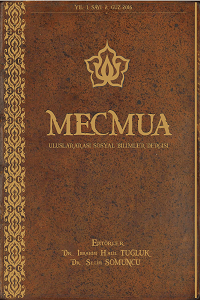Abstract
Savaş her dönemde olduğu gibi o ürkütücü yüzünü bu kez 1939‟da göstermiş ve 1945‟e dek insanlara korku ve dehşet saçmıştır. 20 yüzyılda dünyanın üzerine bir karabasan gibi çöken bu felaket insanları ontolojik anlamda kendisiyle hesaplaşmaya zorlar. Ölüm endişesi, açlık, soğuk ve daha da önemlisi umutsuzluk gibi yaşantılar, Victor E. Franklin‟in de vurguladığı gibi kişiyi varoluşsal bir bunaltıya sürükler. II. Dünya Savaşı ve sonrasında yaşananlar da elbette savaşa dâhil olan ülke insanları için zor günlerdi. Savaş sonrası Alman yazarlarından kısa hikâye türünde belki de en güçlü isim olan Wolfgang Borchert yukarıda bahsedilen sıkıntıları kısa ama etkili bir biçimde dile getiren genç bir yazardır. Borchert akıllarda hep çok genç bir yazar olarak yer etmiştir, çünkü henüz 26 yaşındayken yaşama veda etmiştir. Borchert‟in üslubunu belirleyen en önemli unsurlar onun savaş yaşantılarıdır. Cephede yaralanması, tutukluluk süreci, yargılanması ve geçirdiği ağır hastalıklar onu edebiyat yaparken ağdalı ve komplike bir dil kullanmaktan alıkoyar. Yazarın eserleri son derece sade bir dille kaleme alınmış ancak okuyucuda derin izler bırakacak niteliktedir. Bu çalışmada Borchert‟in “das Brot” adlı kısa hikâyesi konu edilmiş ve farklı açılardan tahlili yapılmıştır. Hikâyenin tahlilinde tek bir yönteme bağlı kalınmayıp birçok yöntemin karma bir biçimde kullanılması uygun görülmüştür.
Keywords
References
- Borchert, Wolfgang (1986). Das Gesamtwerk. Rowohlt Verlag, Hamburg. Deutschland.
- Borchert, Wolfgang (1986). Draussen vor der Tür, Rowohlt Verlag, Hamburg. Deutschland.
- Böll, Heinrich (1961). Erzahlungen, Hörspiele, Aufsatze. Kiepenhauer & Witsch, Köln – Berlin. Deutschland.
- Burgess, Gordon (2007). Wolfgang Borchert. Ich glaube an mein Glück. Aufbau Verlagsgruppe GmbH, Berlin. Deutschland.
- Durzak, Manfred (1981). Deutsche Gegenwartsliteratur: Ausgangspositionen und aktuelle Entwicklungen. Philipp Reclam jun., Stuttgart. Deutschland.
- Rühmkorf, Peter (1961). Wolfgang Borchert. 25. Auflage. Reinbek bei Hamburg: Rowohlt Taschenbuch Verlag GmbH, Deutschland.
- Şahin, Veysel (2007). Roman Tekniği Bakımından Yaban. Newsa – New World Sciences Academy. Volume:2, Number:3, s. 179-196.
- Şahin, Veysel (2011). Kimliksel Değerlerin Çatıştığı Mekan: „Sinekli Bakkal‟ Romanında Yapı ve İzlek. Turkish Studies – International Periodical For The Languages, Literature and History of Turkish or Turkic, Volume 6/3, p. 1549-1580, Summer 2011. Turkey.
- Şahin, Veysel (2013). Halide Edip Adıvar‟ın „Yeni Turan‟ Romanını Yeniden Anlamlandırma. Erdem Dergisi, Sayı 64, s. 103-122.
- URL1. http://de.wikipedia.org/wiki/Kurzgeschichte, (2016-04-11).
Abstract
This time, the war shows its dread ful side in 1939 as it is in all periods, and spreads terror and fear until 1945. Came to grief on the World like an in cubus in 20. century, this disaster forces people to settle accounts with themselves in ontological means. As like Victor E. Franklin emphasizes, the experiences like death fear, hunger, cold and more importantly despair, entail the person to an existential anxiety. Of course, the lives during and after I. World War are trouble some days forthe people participated in the war. Wolfgang Borchet is a young writer who is probably the most powerful name Among Deutch shorts tory writer safter war whoutters the trials and tribulations that mentioned above, in a short and effective way. Borchert is always known as a young writer, because he says farewell to life when he is only 26. The most important factors that determine Borchert‟s wordingare his war experiences. His getting in jured on the battle front, the imprison ment process, hic being put on trial and the serious diseases with hold him fromusing a complicated pompous literary language.The works of the writer are written out in an ultra simple language, but they leave on indelible impression on there aders. In thiss tudy, Borchert‟sshort story named “das Brot” is mentioned and discussed in different aspects. In the analysis of the story, it is found sutiable to use lots of methods in a numerous way rather than using only one method.
Keywords
References
- Borchert, Wolfgang (1986). Das Gesamtwerk. Rowohlt Verlag, Hamburg. Deutschland.
- Borchert, Wolfgang (1986). Draussen vor der Tür, Rowohlt Verlag, Hamburg. Deutschland.
- Böll, Heinrich (1961). Erzahlungen, Hörspiele, Aufsatze. Kiepenhauer & Witsch, Köln – Berlin. Deutschland.
- Burgess, Gordon (2007). Wolfgang Borchert. Ich glaube an mein Glück. Aufbau Verlagsgruppe GmbH, Berlin. Deutschland.
- Durzak, Manfred (1981). Deutsche Gegenwartsliteratur: Ausgangspositionen und aktuelle Entwicklungen. Philipp Reclam jun., Stuttgart. Deutschland.
- Rühmkorf, Peter (1961). Wolfgang Borchert. 25. Auflage. Reinbek bei Hamburg: Rowohlt Taschenbuch Verlag GmbH, Deutschland.
- Şahin, Veysel (2007). Roman Tekniği Bakımından Yaban. Newsa – New World Sciences Academy. Volume:2, Number:3, s. 179-196.
- Şahin, Veysel (2011). Kimliksel Değerlerin Çatıştığı Mekan: „Sinekli Bakkal‟ Romanında Yapı ve İzlek. Turkish Studies – International Periodical For The Languages, Literature and History of Turkish or Turkic, Volume 6/3, p. 1549-1580, Summer 2011. Turkey.
- Şahin, Veysel (2013). Halide Edip Adıvar‟ın „Yeni Turan‟ Romanını Yeniden Anlamlandırma. Erdem Dergisi, Sayı 64, s. 103-122.
- URL1. http://de.wikipedia.org/wiki/Kurzgeschichte, (2016-04-11).
Details
| Journal Section | PHILOLOGIA |
|---|---|
| Authors | |
| Publication Date | December 25, 2016 |
| Published in Issue | Year 2016 Issue: 2 - Autumn 2016 |
DERGİPARK Bünyesinde Faaliyet Gösteren MECMUA Sosyal Bilimler Alanında Yayımlanan
Uluslararası Hakemli Bir Dergidir


